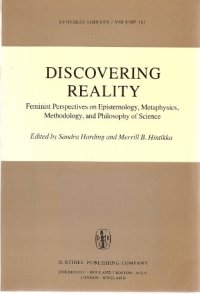
Ebook: Discovering Reality: Feminist Perspectives on Epistemology, Metaphysics, Methodology, and Philosophy of Science
- Genre: Mathematics // Mathematicsematical Physics
- Tags: Epistemology, Philosophy of Science, Methodology of the Social Sciences, Modern Philosophy, Philosophy of Biology
- Series: Synthese Library 161
- Year: 2003
- Publisher: Springer Netherlands
- Edition: 2
- Language: English
- pdf
During the last decade, feminist research has attempted to add understandings of women and their social activities to what we all thought we knew about nature and social life. However, from the very beginning of this project, it has appeared to be in tension with some ofthe most fundamental insightsof the Second Women's Movement. Only recently has the nature ofthis tension become clear. Within the theories, concepts, methods and goals of inquiry we inherited from the dominant discourses we have generated an impressive collection of "facts" about women and their lives, cross-culturally and historically - and we can produce many, many more. But these do not, and cannot, add up to more than a partial and distorted understanding of the patterns of women's lives. We cannot understand women and their lives by adding facts about them to bodies of knowledge which take men, their lives, and their beliefs as the human norm. Furthermore, it is now evident that if women's livescannot be understood within the inherited inquiry frameworks, than neither can men's lives. The attempts to add understandings of women to our knowledge of nature and social life have led to the realization that there is precious little reliable knowledge to which to add them. A more fundamental project now confronts us. Wemust root out sexist distortions and perversions in epistemology, metaphysics, methodology and the philos ophy of science - in the "hard core" of abstract reasoning thought most immune to inftltration by social values.
Are Western epistemology, metaphysics, methodology and the philosophy of science grounded only in men's distinctive understandings of themselves, others, and nature? Does this less than human understanding distort our models of reason and of scientific inquiry? In different ways, the papers in this collection explore the evidence for these increasingly reasonable and intriguing questions. They identify how it is distinctively masculine perspectives on masculine experience which have shaped the most fundamental and formal aspects of systematic thought in philosophy and the natural and social sciences - precisely the aspects of thought believed most gender-neutral. They show how these understandings ground Aristotle's biology and metaphysics; the very definition of the problems of philosophy in Plato, Descartes, Hobbes and Rousseau; the `adversary method' which is the paradigm of philosophic and scientific reasoning; principles of individuation in philosophical ontology and the philosophy of language; individualistic assumptions in psychology; functionalism in sociological and biological theory; evolutionary theory; the methodology of political science; Marxist political economy; and conceptions of `objective inquiry' in the social and natural sciences. These essays also begin to identify for us the distictive aspects of women's experience which can provide the resources needed for the creation of a truly human understanding. Audience: The book will be of interest to those involved in epistemology, and philosophy of the natural and social sciences, as well as feminist scholars in philosophy. The work will also be of value for theorists, methodologists, and feminist scholars in the natural and social sciences.